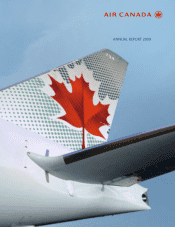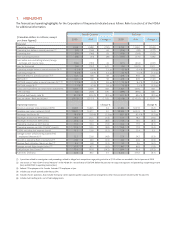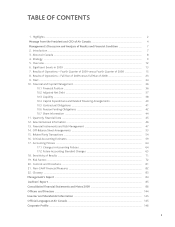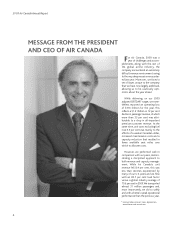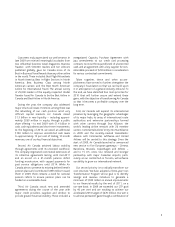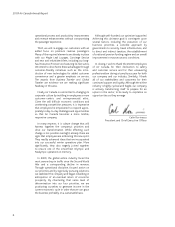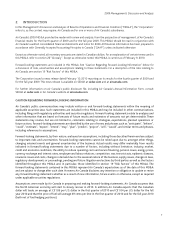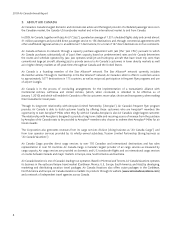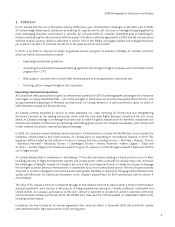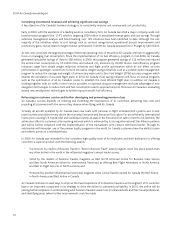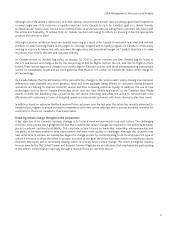Air Canada 2009 Annual Report Download - page 11
Download and view the complete annual report
Please find page 11 of the 2009 Air Canada annual report below. You can navigate through the pages in the report by either clicking on the pages listed below, or by using the keyword search tool below to find specific information within the annual report.2009 Management’s Discussion and Analysis
11
Although one of the airline’s objectives is to further develop and promote premium class, providing a good travel experience
to every single one of its customers is equally important to Air Canada. As such, Air Canada’s goal is to deliver friendly,
professional and “best in class” service on a consistent basis to all its customers, including those customers who travel with
the airline less frequently. To achieve that, Air Canada has been refocusing its efforts on ensuring it has the appropriate
products and services in place.
Although customer satisfaction levels are steadily improving as a result of Air Canada’s investment in its fl eet and onboard
products, its award-winning Maple Leaf Lounges, its concierge program and its loyalty program, Air Canada is continuously
working to improve its interaction with customers through policy and procedural changes. Air Canada’s objective is to make
its policies more simple, effi cient and customer-friendly.
Air Canada revised its checked bag policy on January 19, 2010 to permit travelers one free checked bag for travel to
the U.S. and Europe, and charge a fee for the second bag of $30 for fl ights to/from the U.S., and $50 for fl ights to/from
Europe. These revised bag policy changes more closely align Air Canada’s policies with those prevailing among international
carriers on transatlantic routes and are more generous than those of U.S. carriers on transborder routes, which charge for
all checked bags.
Air Canada believes that the elimination of the call centre fee, changes to the “pets in cabin” policy, making more Aeroplan
redemption seats available and more generous meal and hotel packages being offered to customers during disrupted
operations are helping to improve customer service and thus increasing customer loyalty. In addition, the use of new
technologies such as the Air Canada iPhone App, which won the “Best Mobile Application” at the Canadian New Media
Awards in 2009, the Blackberry App, as well as the self-service rebooking tool allow the airline to communicate more
effectively with customers in times of disrupted operations and provide customers with more choices to plan their travel.
In addition, based on extensive feedback received from customers over the last year, the airline has recently enhanced its
frequent fl yer program to ensure it remains competitive with other airline offerings and to provide an added incentive for
customers to choose Air Canada for their travel needs.
Fostering culture change throughout the Corporation
A key objective of Air Canada’s business strategy is to foster a more entrepreneurial corporate culture. The challenging
economic environment has highlighted the fact that fundamental culture changes are required for the airline to be better
placed to achieve sustained profi tability. This corporate culture focuses on leadership, ownership, entrepreneurship and
the ability to be more nimble to seize opportunities and react more quickly to challenges. Although this objective may
take some time to achieve, Air Canada has begun the change process by communicating to all its employees the type of
culture it envisions to allow the airline to prosper. In pursuit of this goal, the airline has taken actions to simplify processes,
empower employees and is continually seeking means to actively foster culture change. The recent prestigious industry
honours awarded by The Global Traveler and Business Traveler Magazine are an indication that employees are participating
in the airline’s transformation especially through a renewed focus on customer service.

